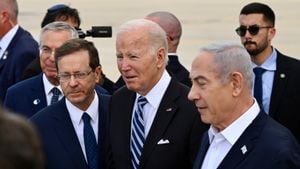With the dust barely settled from the gripping 2024 election season, Democrats find themselves at a crossroads, grappling with the stark reality of their recent losses. This moment of reflection and analysis has revealed deep-seated tensions within the party about its electoral strategy and priorities. Representative Ro Khanna of California, one of the more progressive voices within the Democratic caucus, has emerged as a prominent figure urging the party to pivot and focus on economic issues, positioning them as key to future successes.
During his recent appearance on the CBS Sunday program, Face the Nation, Khanna candidly addressed the reasons behind the Democratic setback. He noted, "The reason we didn’t win, is we didn’t listen enough to people on the ground," emphasizing the need for Democrats to prioritize conversations about economic struggles and hardships faced by ordinary Americans.
Khanna, who won reelection handily with about 66% of the vote against Republican challenger Anita Chen, expressed his disillusionment with the party's campaign strategy. The Democratic Party's focus, he noted, shifted too heavily toward identity politics rather than solid economic messaging. He believes this electoral model has alienated core constituents, particularly among working class and lower-income voters who feel the American Dream has become increasingly unattainable.
Recent polls indicate troubling trends for the party; Democrats lost significant ground among key demographics including Latino and younger voters, which is notable as these groups had previously played pivotal roles in Democratic victories. These losses came hand-in-hand with Donald Trump's decisive win, raising tough questions about the party's current direction. "We have to be uniting on economic issues," Khanna argued, underscoring the importance of addressing wage stagnation, rising childcare costs, and the necessity for more job opportunities.
Echoing Khanna’s sentiments, Senator Chris Murphy from Connecticut weighed in, reinforcing the call for economic populism to become the Democratic Party’s ‘tentpole.’ He acknowledged the failure to connect with voters on economic issues, noting, "We don’t listen enough; we tell people what’s good for them." His reflections echo the long-standing criticism of the party's top-down approach to addressing voter concerns.
Khanna explained the importance of building new factories and creating job opportunities, stressing the need for investment-focused solutions like apprenticeships and revitalizing industrial sectors. He championed policies advocating for raising the minimum wage and making childcare affordable. These initiatives, he believes, would not only resonate with working-class voters but could also unify moderates and progressives within the party.
Beyond the economic discourse, there is recognition among Democrats of the pivotal moments from the recent campaign. Critics, such as Rep. Dean Phillips from Minnesota, highlighted the party’s fixation on countering Trump, arguing it led to ignoring the pressing issues faced by their constituents. Phillips stated, "If our whole argument is about defeating Trump, we will lose perpetually. We need to create invitation rather than condemnation for those who support Trump."
Meanwhile, former Speaker Nancy Pelosi recognized the necessity for improving party messaging, especially following President Biden's late decision to endorse Vice President Kamala Harris. Khanna was cautious about reassigning blame solely to Biden’s actions, instead advocating for more comprehensive engagement with voters’ concerns. "What we missed was the opportunity to present compelling enough economic narratives," he remarked during his television rounds.
The dissatisfaction isn't confined to just voter engagement but extends to the actual policies championed by Democrats, particularly when juxtaposed against the Trump administration's strategies. With Trump winning significant support across various demographics, including working-class communities, there's a palpable urgency for Democrats to become the party of the people once more.
Khanna's remarks provide clarity on the party’s need for revitalization, especially as some districts, including those in Silicon Valley, are seeing shifts toward Republican support. Recognizing the changing political tide, he pointed out, "We need to convince people we have the potential for economic growth and opportunity beyond just taxes or tariffs. We must engage meaningfully with our core messages."
Concern for marginalized communities also surfaced during Khanna’s town halls, where he emphasized the necessity for federal intervention to stem rising housing costs and lack of job security. He cited the urgent need for infrastructure investment and policies addressing the disparities currently faced by various ethnic communities, reinforcing the idea of inclusivity at the heart of economic plans.
To explore these challenges, Khanna shared personal anecdotes during his discussions, including stories of constituents balancing their education amid financial struggles, demonstrating the real human costs underlying economic policies.
Tensions also remain high around the debated issues of immigration and social rights. During the election, Democrats faced significant backlash over handling these topics, resulting in losses among communities traditionally aligned with the party. Khanna openly questioned mass deportation, recognizing the community contributions of undocumented individuals and insisting on more humane solutions.
Reflecting on the Israel-Hamas conflict, he advocated for bipartisan efforts toward lasting peace, emphasizing peace initiatives as necessary areas where Democratic leadership must show clarity and resolve. He argued the party must align its international standing with domestic priorities, a message ensuring voters can see how these issues directly affect their lives.
Despite the challenges, Khanna remains optimistic. He believes the Democratic Party retains the potential to resonate strongly with voters if it can realign its message effectively. "We need to have the priors of listening and addressing economic inequality on the forefront, healing the fractures caused by past missteps and traumas. We need generational change to breathe new life and inclusivity to rebuild our campaign narratives," he told constituents.
With the 2024 election results prompting deep scrutiny and discussions within the Democratic ranks, the upcoming years will be pivotal. Democrats must hone their economic vision and offer solutions to bridge the ever-widening divides within society. By focusing on substantive economic issues rather than ephemeral identity politics, party leaders like Khanna believe they can craft messaging to resonate with disenchanted voters and reclaim their footing across America. The urgency to act has never been more pronounced, as the future of the party hangs delicately in the balance, reshaping not only its image but its very existence.



